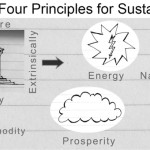Biodegradable Plastic?
By Ian Hall
“We only use biodegradable plastic”. This was a claim made by a resort hotel in support of their responsible tourism policy. Upon further investigation the claim was clarified to mean degradable plastic.
Some plastics marked as ‘degradable’ might not be as environmentally-friendly as consumers think. The implications go beyond greenwashing. In our rush to damn plastic bags and bottles, environmentalists may have compromised efforts to recycle.
Degradable plastic turns out to mean that the plastic will quickly break down into small pieces under influence of light and oxygen. This seems like a good idea given concern about the volume of plastic waste that ends up in landfill or in the sea.
The problem is that these small pieces are still not necessarily biodegradable and it is unclear how long they will persist in the environment and whether they are harmful. Sea turtles may not choke on a discarded degradable plastic bag but there is still a risk that plastic residues that they ingest will be toxic.
The alternative to plastic packaging is paper or reusable fabric bags. Hygiene concerns aside, life cycle analysis shows that it is too close to call which is more environmentally friendly. The debate about pollution by plastic bottles, bags and packaging has therefore reached the point where most are agreed that it is not the plastic itself which is the problem as much as how we dispose of it.
Plastic is recyclable so throwing it away not only causes pollution but wastes a valuable resource.
The real disaster of degradable plastic is that when it is mixed with other plastics during recycling, the end product will be worth less. This would make recycling of plastic less effective and is an unfortunate side effect of environmentalist’s ban-the-bag campaigns.
Surely a ban on degradable plastic would be more appropriate and the issue of non-degradable plastic tackled through recycling incentives and/or a switch to truly biodegradable or compostable plastic?
The latter may not be derived from petroleum at all and can instead be made from plant based products such as corn starch upon which bacteria are happy to chomp. Corn starch bags are being trialled by my colleagues at Borneo Rainforest Lodge and the sample I have been given has held up very well.
The moral of the story? People, like water, will take the path of least resistance. It’s easier to keep producing plastic packaging and to add a little extra to the mix than to change to an alternative product. It’s easier still to believe the greenwash.
Further reading
Unbiased summary from the Royal Society of Chemistry
A critical report on environmental claims of oxy-degradable plastics
DEFRA commissioned Loughborough University Report
Industry comment by Packaging News.co.uk on the Loughborough Report
A company that sells degradable bags and chemicals that can be added to plastic bags to make them degradable.
Correspondence in New Straits Times, Malaysia about a plastic bag ban
Letter from Gary Phong, Selangor Branch Chairman, Malaysian Nature Society
Response from Lim Kok Boon, Chairman Malaysian Plastics Forum
Related posts







Great blog! There is much confusion about the difference between degradable, biodegradable and compostable plastics. When we began searching for a solutionn to the plastic bottle pollution problem we discovered that even compostable plastics require an initial mechanical breakdown by heat and will not break down in your backyard compost.
We ended up working with a company to develop bottles which are both recyclable and biodegradable. Our bottles only break down from the exposure to active microbial environments. We feel that ENSO Biodegradable Bottles are the ideal environmental solution to this issue.
Max Clark
Biodegradable Bottles
A very misleading blog!
When oxo-biodegradable plastics have fragmented they are no longer plastic. They have a completely different molecular structure which allows them to be bioassimilated in the same way as leaves and straw. Oxo-biodegradable additives have been certified not to be toxic and to be safe for food-contact.
The Advertising Standards Authority in South Africa has recently considered the expert evidence and has ruled that Symphony’s d2w oxo-biodegradable plastic is indeed biodegradable.
There is no waste of any valuable resources. d2w plastic is made from a by-product of oil or gas which would otherwise be wasted. It can be re-used many times and incinerated to recover the energy originally in the oil or gas.
d2w plastic can also be recycled together with other oil-based plastics, but “compostable” plastics cannot. http://www.biodeg.org/position-papers/recycling/?domain=biodeg.org
Compostable plastic is designed for industrial composting – see ASTM D6400 para 1.1 – (not garden composting) There is no point in compostable plastic except for garbage sacks used for a dedicated municipal composting scheme, and even there it is not economnic. Compostable bottles and packaging serve only to compromise recycling schemes.
The packaging manager of Tesco (Britain’s largest supermarket) said on 20th October 2009 that the supermarket “does not see the value in packaging that can only be industrially composted” and that “city authorities do not want it, as it can contaminate existing recycling schemes.”
Ian, I like that your blog confuses me (!) & makes me want to learn more. I like the opposing views.
Now there is an another affordable alternative for true Bioplastic and 100% Biodegradable as per EN 13432:2000 / ISO 14855 standards which is called BIOPLAST “Enzyme based Chain-end-Biodegradation” with the lowest cost addition which is designed to biodegrade in open environment and landfills within 180 days after disposal as against starch base as used by other manufacturers world over.
The formulation of the Bacteria (food grade) Enzyme based substrate is absolutely unique and consists of 12 ingredients narrowed down to the enzyme, protein and bacteria compound drawn mainly from natural resources and medicinal plants to make this process methodology/technology non-hazardous and non-toxic. It can also be recycled unlike starch base Bioplastics and oxo-degradable [Fragmentable].
Bioplast is using Nature to solve a Man made problem.
http://bioplast.tk
http://twitter.com/Bioplast
I agree-this can be a confusing and muddled topic. I am glad you wrote about it, but I do believe that switching to an alternative product is possible and have witnessed change already in the community I live in. Granted I am from SF where people tend to be eco-minded as well as aware of the intricacies behind issues like this, I do see there being a shift in American’s awareness of their day to day actions and the impacts they have on the environment, motivating many to make small adjustments like recycling properly.
I work for Viv, a GPO based in SF which pools its purchasing power offering clients discounts of up to 80% on biodegradable and compostable products (http://vivbizclub.com/home2/). Obviously this is an important issue to us and we have done research to ensure that our products are ACTUALLY biodegradable and compostable unlike a lot of other bioplastics out their (ie Taterware). We also indicate which products need to be sent to a commerical composting system to break down in a reasonable amount of time vs. which ones can be placed in a natural composting system. Check out this article RE the difference between compostable and biodegradable and the importance of ASTM and BPI standards: http://vivbizclub.com/blog/2010/03/13/compostable-vs-biodegradable/.
Being a national company (working in over half the country now), we have been able to witness the increasing interest among consumers and businesses for these biodegradable and compostable products.
Thanks again for bringing this issue to the table!
I’ve read the adverts and comments above and followed the links.
I don’t see any evidence that what’s left over after degradable plastic degrades is not harmful / toxic and bio-accumulative.
Symphony’s assertion of non-toxicity only refers to their additive (the chemical that causes the plastic to degrade) and not to the plastic product as a whole.
Regarding recycling; I am corrected in my statement that degradable plastic can’t be recycled. Apparently most of it can but only within a certain timeframe before degradation starts. This would make the waste stream more time critical which I’m not convinced is a good thing if for example waste is shipped abroad for recycling.
References point out that any new product made from recycled degradable plastic would tend to be less durable than if it were made from virgin material. Other impurities or additives (such as stuff to make plastic more or less brittle) may also have the same effect.
There are exceptions like PET bottles that can not be recycled if they contain a degrading additive.
Compostable or crop based plastics cannot be recycled at all and so you could level the same criticism at them as I have made of degradable plastics in respect of cocking up recycling streams.
The composting plot is further thickened by issues of compostablity (it’s not always easy), ethical questions about using food crops for packaging (think bio-fuel debate), agricultural politics (fair trade) and agricultural practices (GM crops and chemical inputs).
In conclusion my stance on degradable vs compostable plastic is now ambivalent and I’ll look forward to hearing further arguments. Many thanks to all of you who have contributed to the debate so far.
Ian
References
http://www.degradable.net/response.pdf
http://www.rsc.org/publishing/ebooks/1999/9780854045310.asp
http://www.biodeg.org/position-papers/recycling/?domain=biodeg.org
http://randd.defra.gov.uk/Document.aspx?Document=EV0422_8858_FRP.pdf
http://www.smithsonianmag.com/science-nature/10022381.html
http://www.calrecycle.ca.gov/publications/Plastics/2009001.pdf
http://www.straightdope.com/columns/read/2915/whats-up-with-compostable-plastics